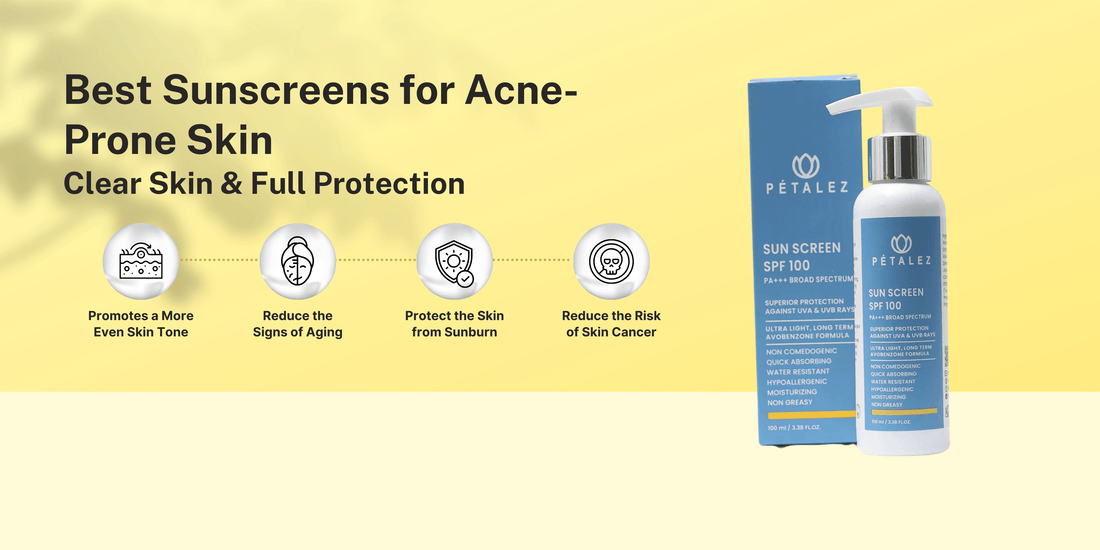
Best Sunscreens for Acne-Prone Skin: Clear Skin & Full Protection
Share
If you’ve ever skipped sunscreen because you feared breakouts, you’re not alone. Many people with acne-prone skin avoid sunscreen, thinking it will clog pores or make oily skin worse. But the truth is, sun protection is essential, especially if you’re using acne treatments that make your skin more sensitive to UV damage.
UV rays don’t just cause premature aging and pigmentation, they can also worsen acne scars and delay healing. The right sunscreen can protect your skin and support a clearer, healthier complexion.
What Happens When Acne-Prone Skin Is Exposed to Sun?
Sun exposure might initially seem like it helps acne, reducing inflammation and drying out breakouts. But this is temporary and misleading. In reality, the sun:
- Increases pigmentation and darkens acne marks
- Triggers more oil production in the long run
-
Damages the skin barrier, making breakouts more likely
-
Causes long-term skin aging and the risk of skin cancer
Bottom line? Even acne-prone skin needs sunscreen every single day.
What Should You Look for in a Sunscreen for Acne-Prone Skin?
Choosing the wrong sunscreen can worsen acne, but the right one can protect and even soothe your skin. Here’s what to look for:
-
Oil-free & non-comedogenic: Won’t clog pores or feel heavy
-
Broad-spectrum SPF 30+: Blocks both UVA (aging) & UVB (burning) rays
-
Lightweight or gel-based formulas: Great for oily or acne-prone skin
-
Fragrance-free & hypoallergenic: Reduces risk of irritation
- Matte finish: Controls shine for a fresh look
Physical vs. Chemical Sunscreens: What’s Better?
There are two main types of sunscreens:
Physical (Mineral) Sunscreens
-
Contain zinc oxide or titanium dioxide
-
Sit on top of the skin and reflect UV rays
-
Less likely to irritate sensitive or acne-prone skin
-
May leave a white cast (though modern formulas are improving!)
Chemical Sunscreens
-
Contain ingredients like avobenzone, octinoxate, and oxybenzone
-
Absorb UV rays and neutralize them
-
Blend easily with skin and leave no white cast
-
May irritate some sensitive skin types
For acne-prone skin, both can work well but mineral sunscreens are often gentler if your skin is also sensitive or reactive.
How to Use Sunscreen the Right Way

Even the best sunscreen won’t work if you don’t apply enough or skip reapplying. Here’s how to do it right:
How much to apply?
-
½ tsp for face + neck
-
1 shot glass (approx. 1 oz) for full body
When to apply?
-
15 minutes before sun exposure
-
Reapply every 2–3 hours if outdoors
-
Always reapply after sweating or swimming
Even if you're indoors but near windows or screens, your skin still needs protection from UVA rays and blue light.
Sunscreen Tips for Acne-Prone Skin

-
Use sunscreen daily — even if it’s cloudy
-
Cleanse skin thoroughly at night to remove sunscreen residue
-
Layer sunscreen over a lightweight, oil-free moisturizer
-
Avoid overly greasy sunscreens or heavy creams
- Patch test new products to avoid flare-ups
Conclusion
Sunscreen is a must for acne-prone skin, not just for preventing sunburn but also for protecting your skin from UV damage that can worsen acne scars and cause premature aging. With the right sunscreen, you can shield your skin from harmful rays without the worry of breakouts. So don’t skip the SPF, and make it a part of your daily skincare routine for healthier, clearer skin.
Use Petalez Sunscreen
For optimal protection, use Petalez SPF 50+ Sunscreen! Petalez offers broad-spectrum protection with non-comedogenic, oil-free, and fragrance-free formulas, making it a perfect choice for acne-prone skin. It's designed to shield your skin from harmful UV rays while preventing breakouts.
Frequently Asked Questions (FAQs)
1. Can sunscreen cause acne?
No, but the wrong type of sunscreen can. Look for oil-free, non-comedogenic options to avoid clogged pores. Always patch-test a new product before applying it all over your face.
2. How do I choose the best sunscreen for acne-prone skin?
Opt for broad-spectrum protection (SPF 30 or higher), oil-free formulas, and matte finish sunscreens. Mineral sunscreens (containing zinc oxide or titanium dioxide) are generally gentler on sensitive or acne-prone skin.
3. Do I need to wear sunscreen every day?
Yes! Even on cloudy or rainy days, UV rays still reach your skin and can cause damage. Make sunscreen a part of your daily routine to protect your skin long-term.
4. Can I wear makeup over sunscreen?
Absolutely! Many sunscreens, like Supergoop! Unseen Sunscreen works as a primer and can be worn under makeup. Just ensure that your makeup products don’t block your pores.
5. Can sunscreen help fade acne scars?
While sunscreen won't directly treat acne scars, it will prevent them from darkening due to UV exposure, which can make scars more prominent. Protecting your skin with sunscreen can speed up the healing process.


